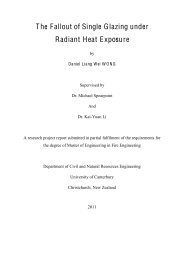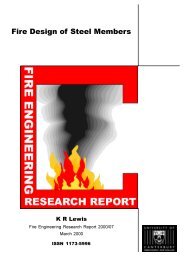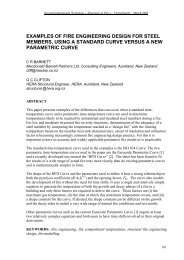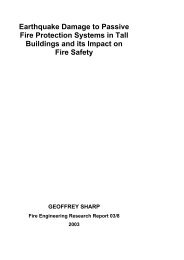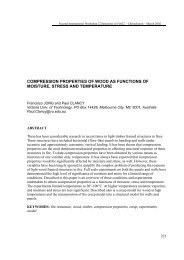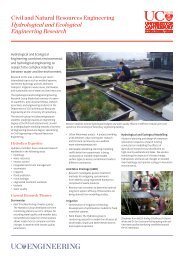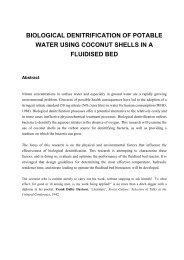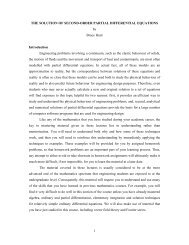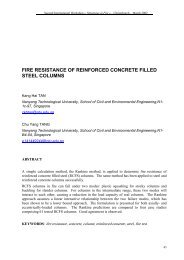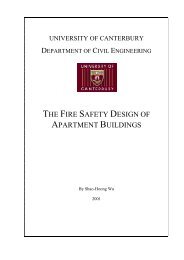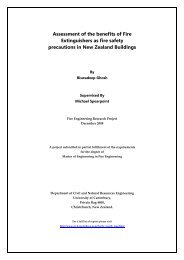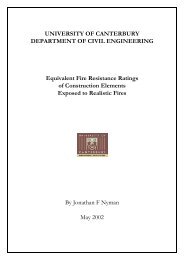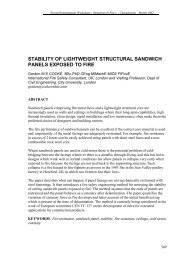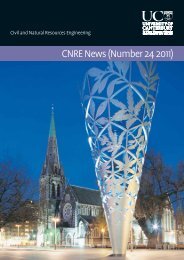University of Canterbury Department of Civil and Natural Resources ...
University of Canterbury Department of Civil and Natural Resources ...
University of Canterbury Department of Civil and Natural Resources ...
Create successful ePaper yourself
Turn your PDF publications into a flip-book with our unique Google optimized e-Paper software.
Message from the Head <strong>of</strong> <strong>Department</strong><br />
Welcome to the <strong>Department</strong> <strong>of</strong> <strong>Civil</strong> <strong>and</strong> <strong>Natural</strong> <strong>Resources</strong> Engineering.<br />
The <strong>Department</strong>, which has existed as the <strong>Department</strong> <strong>of</strong> <strong>Civil</strong> Engineering since<br />
about 1930, has recently changed its name to the <strong>Department</strong> <strong>of</strong> <strong>Civil</strong> <strong>and</strong> <strong>Natural</strong><br />
<strong>Resources</strong> Engineering. The new name reflects the fact that we <strong>of</strong>fer two BE<br />
(Hons) programmes, one in <strong>Civil</strong> Engineering (this has been <strong>of</strong>fered at the<br />
<strong>University</strong> <strong>of</strong> <strong>Canterbury</strong> since 1888) <strong>and</strong> one in <strong>Natural</strong> <strong>Resources</strong> Engineering<br />
(this started in 1967 as Agricultural Engineering, <strong>and</strong> became the responsibility <strong>of</strong><br />
the <strong>Department</strong> in 2004, when Lincoln <strong>University</strong> withdrew its support).<br />
The <strong>Department</strong> has a long history <strong>of</strong> educating Pr<strong>of</strong>essional Engineers to a high<br />
st<strong>and</strong>ard, with the BE (<strong>Civil</strong>) degree being the first degree outside the United<br />
Kingdom to be accepted by the UK Institution <strong>of</strong> <strong>Civil</strong> Engineers as meeting their<br />
academic requirements for a Pr<strong>of</strong>essional Engineer.<br />
Both the <strong>Civil</strong> <strong>and</strong> <strong>Natural</strong> <strong>Resources</strong> programmes have recently been re-accredited<br />
by the NZ Institution <strong>of</strong> Pr<strong>of</strong>essional Engineers, <strong>and</strong> this means that the two degrees<br />
are recognised internationally, so you can (once you have completed either degree)<br />
practise as a Pr<strong>of</strong>essional Engineer around the world. The degree programmes must<br />
ensure students achieve an appropriate st<strong>and</strong>ard in certain topics, otherwise they<br />
will lose accreditation. Hence, all topics in the programmes are important <strong>and</strong><br />
relevant to the education <strong>of</strong> Pr<strong>of</strong>essional Engineers.<br />
The dem<strong>and</strong> for our graduates is very high <strong>and</strong> is expected to remain high for the<br />
foreseeable future. Our graduates work in a very wide range <strong>of</strong> ‘practice areas’,<br />
including <strong>Civil</strong>, Transport, Structural, Waste/Water, Environmental/Ecological,<br />
Geotechnical <strong>and</strong> Fire. There are plenty <strong>of</strong> opportunities, challenges <strong>and</strong> rewards in<br />
all these areas; none is inherently more challenging, exciting, rewarding or ‘highstatus’<br />
than the others.<br />
Both BE (Hons) programmes are designed to provide you with a good<br />
underst<strong>and</strong>ing <strong>of</strong> a wide range <strong>of</strong> topic areas; indeed, the most common ‘practice<br />
area’ for our graduates is <strong>Civil</strong>, which involves a wide range <strong>of</strong> activities. You will<br />
be able to specialise to a limited extent during the BE (Hons), <strong>and</strong> you will be able<br />
to choose courses related to the particular practice area that appeals to you. If you<br />
wish to become a real specialist in any area, you will need to undertake<br />
postgraduate study, <strong>and</strong> the <strong>Department</strong> already has a number <strong>of</strong> specialist Masters<br />
programmes (with others under development) <strong>and</strong> a PhD programme. We look<br />
forward to seeing a substantial proportion <strong>of</strong> you returning for postgraduate studies.<br />
Finally, I hope your studies go well, but remember that what you learn depends to a<br />
considerable extent upon the effort that you make.<br />
Alan Nicholson<br />
2<br />
`



